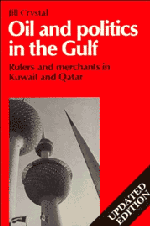Book contents
3 - Kuwait on the eve of oil
Published online by Cambridge University Press: 04 April 2011
Summary
In the interwar period, Kuwait's merchants crystallized into a new political force. By the early twentieth century the merchants had gradually evolved into a homogeneous and unified economic and social elite. Their political power, which flowed from this economic and social power, was institutionalized in a series of informal and semiformal mechanisms – marriage and majlis – that granted them access to the palace. In the interwar period, a combination of severe economic pressures and political opportunities, including open divisions within the ranks of the ruling family, led the merchants to reorganize politically, culminating in a briefly successful demand for parliamentary representation in the Majlis Movement of 1938. Up to this point the struggle between the rulers and the emerging bourgeoisie was following a classic pattern. Then, just when the merchants' political influence was at its peak, oil arrived. This new economic force transformed the emerging struggle between the merchants and the ruler and gave rise to a new pattern of politics.
The merchants' interwar political interventions were failures in that they did not secure enduring, formal access to decision-making. However, these acts, in conjunction with the disputes within the ruling family which they helped fuel, had unintended consequences. In terms of alliances, the political action of the 1930s reinforced a sense of community among the merchants. Later in the century this corporate sense was crucial in helping merchants pass on to their children and grandchildren privileged access to the new oil-generated wealth.
- Type
- Chapter
- Information
- Oil and Politics in the GulfRulers and Merchants in Kuwait and Qatar, pp. 36 - 61Publisher: Cambridge University PressPrint publication year: 1990

